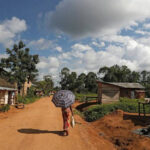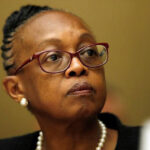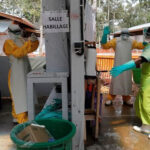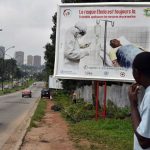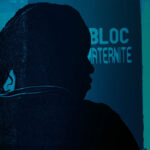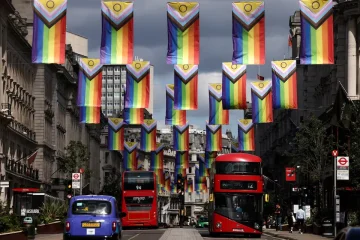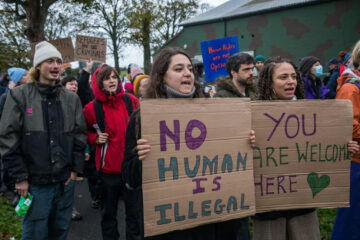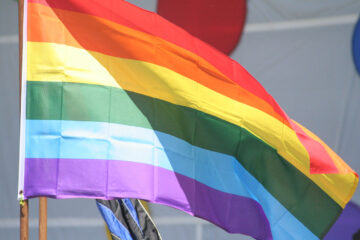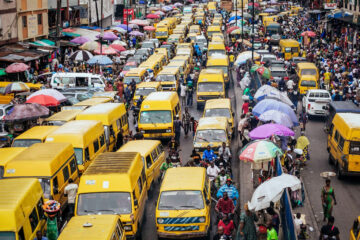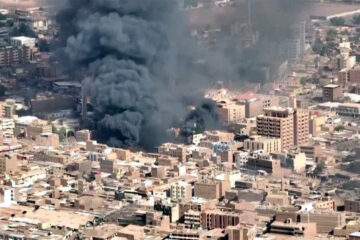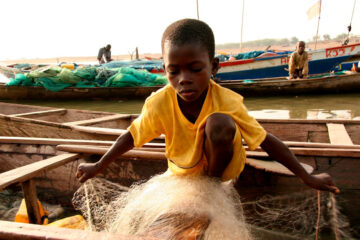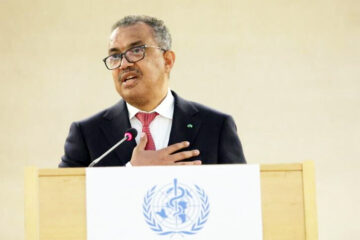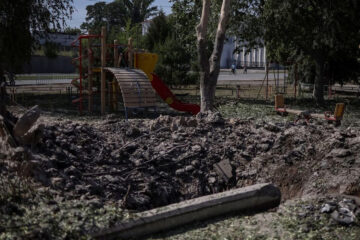PAISLEY DODDS
EARLY last year during a trip to the Ebola outbreak zones in the Democratic Republic of Congo, we were tipped off that aid workers might be sexually abusing and exploiting women.
“Oh, they love our ladies,” reporter Robert Flummerfelt was told in March 2019 at a bar in Butembo, one of two hubs for workers trying to contain the virus in Congo’s northeast. “They arrive in military convoys to take the sick for treatment, and they are always taking the women.”
Even though the practice seemed well known, we were warned few women would talk. “The victims of this are carrying a secret that they will bring to their graves,” one man said.
We set out to find the women.
It took us about a year to gather detailed allegations from dozens of women in what became a joint investigation between The New Humanitarian and the Thomson Reuters Foundation. In the end, 51 women spoke to us. They said they were propositioned, abused, or lured into sex-for-work schemes – mostly by international aid workers. Thirty of the women accused men from the World Health Organization (WHO). Many of the women’s accounts were corroborated by aid agency drivers and other NGO officials we interviewed.
It wasn’t easy getting the women to talk to us.
During the short span of their lives – one woman had just turned 18 – the women had already dodged bullets, massacres, rapes, and disease.
Now, they were colloquially being referred to as “appetisers” by international aid workers.
The first woman shared her story with us in October 2019, when we were in Beni – the other main epicentre and response hub in Congo’s North Kivu province – reporting on how women and girls were faring more generally in the outbreak.
The woman already had a job, but said she was constantly harassed by aid workers. “They say, ‘you’re not making good money; if you have sex with me, I’ll promote you’,” she told reporter Sam Mednick, as Mednick looked into claims of exploitation and kept reporting on another story that focused on why women weren’t being warned of the risk of contracting Ebola through unprotected sex.
“Everyone appeared to know what was going on – from local and international aid workers to high-ranking officials, doctors, nurses, and community members,” Mednick said, recalling conversations during that trip, and that she had wondered why – if everyone knew – no one was reporting the abuse.
Unable to stay after learning she was being kicked out of neighbouring South Sudan – where she was based, reporting on government corruption – Mednick left Beni. But she continued reporting remotely.
“People laughed me off the phone.”
Meanwhile, Flummerfelt – fluent in Kiswahili and based in Goma, the capital of North Kivu province – kept digging. Female Congolese researchers (whose names are being withheld for security reasons) pitched in.
Flummerfelt kept hearing the same thing. “You won’t find a single person who will talk to you about this,” one researcher in Beni told him.
“People laughed me off the phone,” Flummerfelt said.
We knew we were onto something.
We started looking into flights and putting together a reporting plan that carefully considered the safety risks – violence could easily flare up, and Ebola health centres and workers had come under attack.
The New Humanitarian has been covering the Ebola outbreak from the beginning, and we have also consistently investigated sexual abuse and exploitation in humanitarian crises – from the UN peacekeeper scandal in the Central African Republic to Oxfam in Haiti. Allegations of such abuse during the Ebola response, however, had not been detailed.
As we continued our coverage of the Ebola outbreak, TNH contributor Emmanuel Freudenthal spent weeks in the region on an investigation that detailed how community resentment was bubbling over because of what had become known as “the Ebola business”. While there, he heard sexual exploitation listed amongst community grievances.
TNH correspondent Philip Kleinfeld, meanwhile, was sent to neighbouring South Kivu province in February to investigate a separate story involving allegations of widespread fraud and corruption across the aid sector.
Then COVID-19 hit.
With travel on hold, we turned to research.
We asked aid groups how many sexual abuse allegations had been reported during the Ebola response. Had workers been dismissed because of allegations? What practices were in place to prevent such abuse and exploitation?
We also looked at the gender and power dynamics of the response – how many relief workers were men? How many women were in decision-making roles? How much of the some $700 million spent on the response went to protecting women and girls?
Our investigative intern – Izzy Ellis – plugged the data into tables and charts.
Then, in early June, we caught a big break.
Kleinfeld, also TNH’s deputy Africa editor, obtained a leaked report that detailed not only the widespread corruption he had been investigating but also sexual exploitation within the Ebola response. The report, commissioned by the British government, added further weight to the allegations we were hearing.
Travel restrictions eased. Flummerfelt arrived in Beni in early July.
His first stop was a local women’s organisation, SOFEPADI. Their members had heard rumours of sex-for-jobs schemes in the Ebola response, but only one woman had come to them.
“We do radio campaigns to encourage women to come to us,” one member explained. “But why would they? If your family doesn’t know that this happened, will you come forward to strangers talking on the radio?”
Days had passed when a Beni-based researcher called Flummerfelt to tell him that three women who had worked for the WHO during the response had stories to share. They were willing to talk.
At first, the women were nervous. Flummerfelt and a female Congolese researcher (whose name is being withheld for security reasons) met with them. The initial meetings stretched for several days.
After gaining the women’s trust, they put us in touch with others.
Sometimes the women’s voices broke, their hands trembling and tears rolling down the cheeks. None expected justice, they said: They just wanted their stories to be heard so other women wouldn’t experience the same thing.
Flummerfelt interviewed dozens of women, all divulging similar details. We became all the more determined that the investigation – and the women’s stories – should get global attention.
That’s when we turned to the Thomson Reuters Foundation. We knew they had deep experience reporting from the region and that their reputation for accurate, impartial journalism would add to the credibility of the investigation. We also knew the Foundation’s global reach would ensure our joint investigation would be shared with hundreds of media organisations worldwide.
In August, a Thomson Reuters Foundation reporter (whose name is being withheld over security concerns) visited Beni to locate and talk to additional women, and to interview more aid workers and officials. That reporter’s findings echoed our earlier reporting.
Nellie Peyton – Thomson Reuters Foundation’s West Africa correspondent – interviewed UN officials and aid officials involved in the response. She also reached out to experts on sexual abuse and exploitation to understand why the problem has continued despite “zero tolerance” pledges by the UN and NGOs.
In Goma, London, and Geneva, meanwhile, we continued our research and drafted the stories.
Keeping the women’s names private seemed to rob them of yet even more dignity, but it was the only way we could tell their stories. We scoured the final draft, removing any details that might identify them – or the men they had named.
We wanted the world to actually hear those stories. So we turned to Whitney Patterson – TNH’s audience engagement editor. Patterson worked with Congolese reporter Guylain Balume and two Congolese women to read the women’s testimonies and turn them into audio clips.
Those voiced-over testimonies were used on television and radio around the world, including in Congo.
Translators from the Thomson Reuters Foundation team also produced French versions of written reports to reach the French-language media in Congo.
All told, more than 20 major mainstream media outlets – including The Times of London, The New York Times, the BBC, France24, and Le Monde – covered this story. More than 50 regional or local media outlets and specialist media picked it up, too.
The WHO and other NGOs have vowed to investigate, and officials from the UN secretary-general to representatives of major European and North American governments have signalled outrage.
None of the women we spoke to expect much will be done.
If similar scandals are any guide, nothing much will be done.
At the most, aid organisations could track down employees who have been accused and, if the allegations are substantiated, fire them. But sex abuse allegations are difficult to substantiate. The women who were impregnated could also file paternity claims; but that won’t be easy, as many of the men have left Congo.
“To hear those stories from morning to evening – and to think they were sharing them with a complete stranger – was crushing,” Flummerfelt said of his reporting. “I wondered – and still do – how I can ever do justice to the women whose testimonies we heard.”
- Paisley Dodds joined as TNH’s investigations editor after more than 20 years at The Associated Press. In recent years, she has investigated UN peacekeeper abuse in Haiti, Central African Republic, and the Democratic Republic of Congo.


